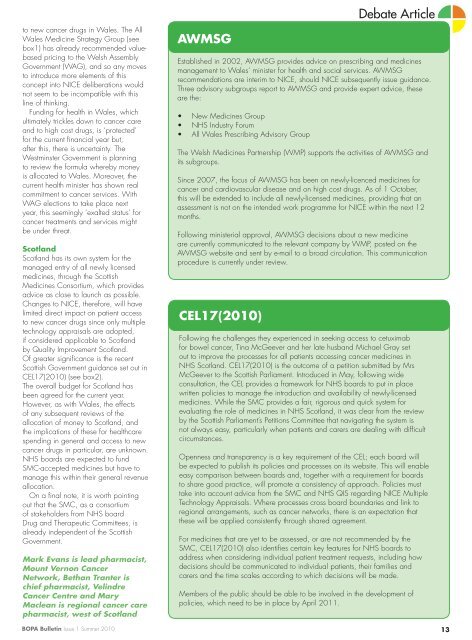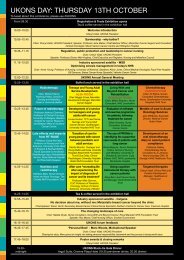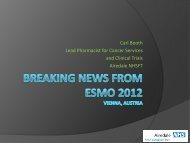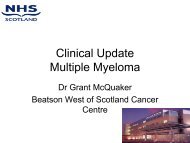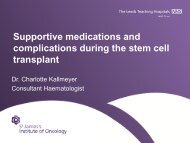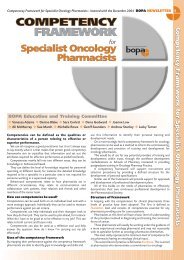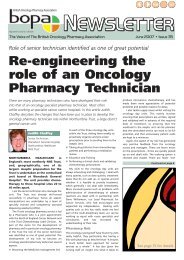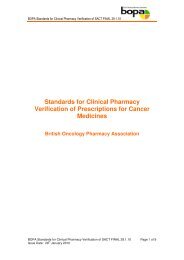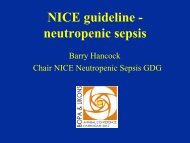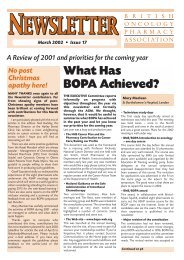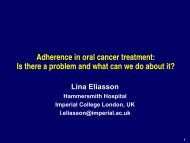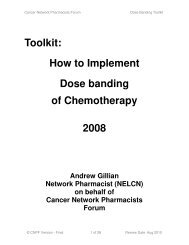What might the current Westminster Government mean for ... - BOPA
What might the current Westminster Government mean for ... - BOPA
What might the current Westminster Government mean for ... - BOPA
Create successful ePaper yourself
Turn your PDF publications into a flip-book with our unique Google optimized e-Paper software.
to new cancer drugs in Wales. The All<br />
Wales Medicine Strategy Group (see<br />
box1) has already recommended valuebased<br />
pricing to <strong>the</strong> Welsh Assembly<br />
<strong>Government</strong> (WAG), and so any moves<br />
to introduce more elements of this<br />
concept into NICE deliberations would<br />
not seem to be incompatible with this<br />
line of thinking.<br />
Funding <strong>for</strong> health in Wales, which<br />
ultimately trickles down to cancer care<br />
and to high cost drugs, is ‘protected’<br />
<strong>for</strong> <strong>the</strong> <strong>current</strong> financial year but,<br />
after this, <strong>the</strong>re is uncertainty. The<br />
<strong>Westminster</strong> <strong>Government</strong> is planning<br />
to review <strong>the</strong> <strong>for</strong>mula whereby money<br />
is allocated to Wales. Moreover, <strong>the</strong><br />
<strong>current</strong> health minister has shown real<br />
commitment to cancer services. With<br />
WAG elections to take place next<br />
year, this seemingly ‘exalted status’ <strong>for</strong><br />
cancer treatments and services <strong>might</strong><br />
be under threat.<br />
Scotland<br />
Scotland has its own system <strong>for</strong> <strong>the</strong><br />
managed entry of all newly licensed<br />
medicines, through <strong>the</strong> Scottish<br />
Medicines Consortium, which provides<br />
advice as close to launch as possible.<br />
Changes to NICE, <strong>the</strong>re<strong>for</strong>e, will have<br />
limited direct impact on patient access<br />
to new cancer drugs since only multiple<br />
technology appraisals are adopted,<br />
if considered applicable to Scotland<br />
by Quality Improvement Scotland.<br />
Of greater significance is <strong>the</strong> recent<br />
Scottish <strong>Government</strong> guidance set out in<br />
CEL17(2010) (see box2).<br />
The overall budget <strong>for</strong> Scotland has<br />
been agreed <strong>for</strong> <strong>the</strong> <strong>current</strong> year.<br />
However, as with Wales, <strong>the</strong> effects<br />
of any subsequent reviews of <strong>the</strong><br />
allocation of money to Scotland, and<br />
<strong>the</strong> implications of <strong>the</strong>se <strong>for</strong> healthcare<br />
spending in general and access to new<br />
cancer drugs in particular, are unknown.<br />
NHS boards are expected to fund<br />
SMC-accepted medicines but have to<br />
manage this within <strong>the</strong>ir general revenue<br />
allocation.<br />
On a final note, it is worth pointing<br />
out that <strong>the</strong> SMC, as a consortium<br />
of stakeholders from NHS board<br />
Drug and Therapeutic Committees, is<br />
already independent of <strong>the</strong> Scottish<br />
<strong>Government</strong>.<br />
Mark Evans is lead pharmacist,<br />
Mount Vernon Cancer<br />
Network, Bethan Tranter is<br />
chief pharmacist, Velindre<br />
Cancer Centre and Mary<br />
Maclean is regional cancer care<br />
pharmacist, west of Scotland<br />
AWMSG<br />
Established in 2002, AWMSG provides advice on prescribing and medicines<br />
management to Wales’ minister <strong>for</strong> health and social services. AWMSG<br />
recommendations are interim to NICE, should NICE subsequently issue guidance.<br />
Three advisory subgroups report to AWMSG and provide expert advice, <strong>the</strong>se<br />
are <strong>the</strong>:<br />
• New Medicines Group<br />
• NHS Industry Forum<br />
• All Wales Prescribing Advisory Group<br />
CEL17(2010)<br />
Debate Article<br />
The Welsh Medicines Partnership (WMP) supports <strong>the</strong> activities of AWMSG and<br />
its subgroups.<br />
Since 2007, <strong>the</strong> focus of AWMSG has been on newly-licenced medicines <strong>for</strong><br />
cancer and cardiovascular disease and on high cost drugs. As of 1 October,<br />
this will be extended to include all newly-licensed medicines, providing that an<br />
assessment is not on <strong>the</strong> intended work programme <strong>for</strong> NICE within <strong>the</strong> next 12<br />
months.<br />
Following ministerial approval, AWMSG decisions about a new medicine<br />
are <strong>current</strong>ly communicated to <strong>the</strong> relevant company by WMP, posted on <strong>the</strong><br />
AWMSG website and sent by e-mail to a broad circulation. This communication<br />
procedure is <strong>current</strong>ly under review.<br />
Following <strong>the</strong> challenges <strong>the</strong>y experienced in seeking access to cetuximab<br />
<strong>for</strong> bowel cancer, Tina McGeever and her late husband Michael Gray set<br />
out to improve <strong>the</strong> processes <strong>for</strong> all patients accessing cancer medicines in<br />
NHS Scotland. CEL17(2010) is <strong>the</strong> outcome of a petition submitted by Mrs<br />
McGeever to <strong>the</strong> Scottish Parliament. Introduced in May, following wide<br />
consultation, <strong>the</strong> CEL provides a framework <strong>for</strong> NHS boards to put in place<br />
written policies to manage <strong>the</strong> introduction and availability of newly-licensed<br />
medicines. While <strong>the</strong> SMC provides a fair, rigorous and quick system <strong>for</strong><br />
evaluating <strong>the</strong> role of medicines in NHS Scotland, it was clear from <strong>the</strong> review<br />
by <strong>the</strong> Scottish Parliament’s Petitions Committee that navigating <strong>the</strong> system is<br />
not always easy, particularly when patients and carers are dealing with difficult<br />
circumstances.<br />
Openness and transparency is a key requirement of <strong>the</strong> CEL; each board will<br />
be expected to publish its policies and processes on its website. This will enable<br />
easy comparison between boards and, toge<strong>the</strong>r with a requirement <strong>for</strong> boards<br />
to share good practice, will promote a consistency of approach. Policies must<br />
take into account advice from <strong>the</strong> SMC and NHS QIS regarding NICE Multiple<br />
Technology Appraisals. Where processes cross board boundaries and link to<br />
regional arrangements, such as cancer networks, <strong>the</strong>re is an expectation that<br />
<strong>the</strong>se will be applied consistently through shared agreement.<br />
For medicines that are yet to be assessed, or are not recommended by <strong>the</strong><br />
SMC, CEL17(2010) also identifies certain key features <strong>for</strong> NHS boards to<br />
address when considering individual patient treatment requests, including how<br />
decisions should be communicated to individual patients, <strong>the</strong>ir families and<br />
carers and <strong>the</strong> time scales according to which decisions will be made.<br />
Members of <strong>the</strong> public should be able to be involved in <strong>the</strong> development of<br />
policies, which need to be in place by April 2011.<br />
<strong>BOPA</strong> Bulletin Issue 1 Summer 2010 13


